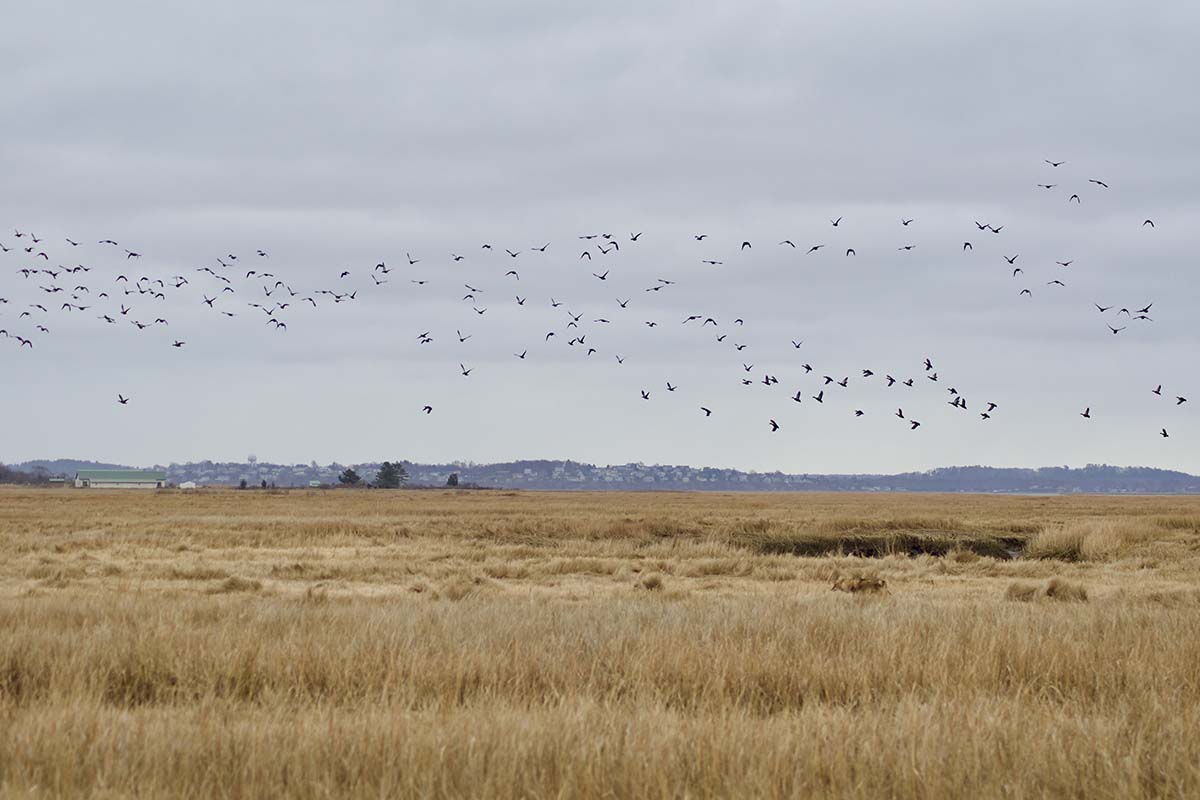Black Duck and Mallard Telemetry Project Will Explore Population Declines
The new study will examine post-hatch success critical to the future management of these species
The new study will examine post-hatch success critical to the future management of these species

A coyote spooks a group of black ducks at Parker River NWR in Massachusetts.
Black duck populations were once on the brink of extinction, dropping by more than 50% from the 1950s to the 1980s. While the breeding population has stabilized, black ducks remain below North American Waterfowl Management Plan goals.
Meanwhile, breeding mallards in the Atlantic Flyway have declined 1.1% per year since 1998 and 39% in the northeast U.S. between 1998 and 2023. Waterfowl professionals have proposed several explanations for mallard and black duck declines, including hybridization between the two closely related species, wetland loss and the degradation of breeding, staging and wintering areas, among other factors.
Ducks Unlimited (DU) aims to better understand black duck and mallard ecology during the breeding period by partnering with the State University of New York-Brockport, Pennsylvania Game Commission, University of Saskatchewan, New York State Department of Environmental Conservation (NYSDEC), Delaware Department of Natural Resources and Environmental Control and 16 other state, provincial and federal agencies. This new study will use GPS telemetry units to track bird locations and identify which females had successful nests. Then researchers will use unmanned aerial drones to identify brood-rearing behavior among black ducks and mallards in eastern North America.
“Waterfowl brood ecology can be difficult to study, but there is substantial evidence that suggests nest success and brood survival greatly influence population trajectories,” said Dr. John Coluccy, DU director of conservation science and planning.
The work will leverage two large-scale telemetry studies that will mark 1,700 hen mallards and black ducks with GPS units by 2025. Researchers have developed a methodology using location and accelerometer data collected by the telemetry units to identify incubating hens. Once they hatch, Abbey Butler, a graduate student from SUNY-Brockport, and numerous other drone operators in eastern North America, will use GPS locations and drones to monitor and count a subset of broods at least three times during the brood rearing period.
“From monitoring a subsample of known brood-rearing hens, we will be able to use location and accelerometer data to develop a reliable brood-rearing classification signature and apply that to our entire sample of marked hens,” Butler said. “This is a critical first step in determining environmental, habitat and landscape variables that best explain mallard and black duck reproduction."
Ultimately, the work will help prioritize critical brood-rearing areas for wetland conservation throughout the breeding range of these species in North America.
“While the data from these transmitters will continue to provide novel insights regarding movements, habitat use, survival, and connecting cross-seasonal effects, the transmitters themselves cannot evaluate the success of ducklings and broods after hatch without refining the data analysis techniques,” said Jake Straub, a senior research associate at SUNY-Brockport. “Our project will create a framework to close this gap so we can understand why mallard and black duck broods are successful or why they fail.”
A pilot project on eastern mallards was initiated during the 2023 breeding season. Drone pilots attempted to locate and monitor GPS-tagged hen mallards with suspected broods. The effort was split between pilots from NYSDEC’s aviation unit and a private operator in Ontario. Operators completed 13 flights of suspected broods and confirmed broods on over half of those flights.
“Even with GPS-marked hens, it was a challenge to ensure we documented transmitting hens and their broods as many wetlands had multiple mallard broods,” said Josh Stiller, NYSDEC’s Small Game Unit Leader. “We will take what we learned during the pilot year and dial in our approach”.
Media Contact
Joe Genzel
(309) 453-0979
jgenzel@ducks.org
Ducks Unlimited uses cookies to enhance your browsing experience, optimize site functionality, analyze traffic, and deliver personalized advertising through third parties. By continuing to use this site, you agree to our use of cookies. View Privacy Policy